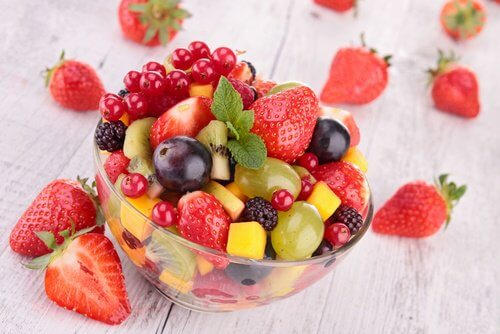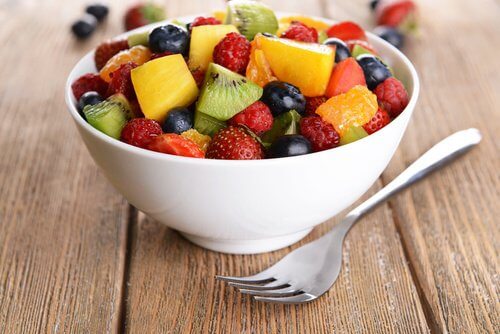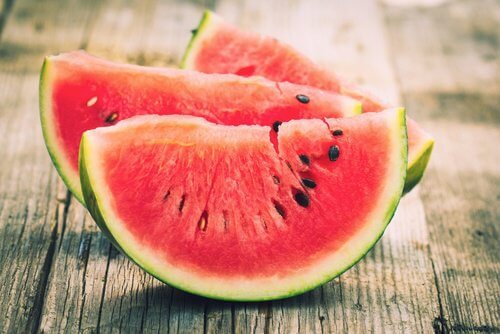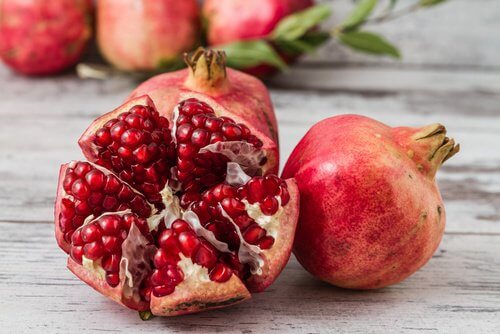Fruits That May Help Reduce Bloating

There are foods that increase constipation, inflammation, and gas. However, there are others that help us with these problems. In this article, we will share the best fruits to help reduce bloating.
Add these to your diet today!
Fruits: allies to help reduce bloating

Large meals, excessive carbohydrates, fats, and snacks at different times of the day are only some of the things that cause bloating.
Bad eating habits come with many complications. They affect you just as much physically as they affect your health.
Besides bloating, gas, or constipation, they’ll make you feel “heavy.” This comes with a lack of motivation to do anything. It’s also a little depressing when you try on clothes in front of a mirror.
Because of this, it’s always important to maintain a healthier diet. Above all, your diet should be full of fibers that help your body get rid of waste and fats.
The first thing you should change is a bad choice in nutrients.
Then, adding more fresh and natural foods should follow.
Fruit, for example, has excellent digestive properties, a low fat content, and it’s great for hydration. At the same time, it provides a large amount of fiber that helps your body get rid of toxins.
The magic number is five pieces of fruit per day. For example, this could mean you eat one for breakfast, one for a mid-morning snack, one after lunch, one for a mid-afternoon snack, and one after dinner.
Switching between the fruits you like the most is a good idea. It’s also a good idea to choose both seasonal and local fruits. The fruit you buy should be organic if at all possible to help maintain its nutrients.
What are the best fruits to help reduce bloating?

All fruits are good for helping with this problem!
However, there are definitely some fruits that are more effective than others. If you want to fight bloating, constipation, and gas, we recommend the following:
Citrus fruit
Oranges and grapefruits are 90% water. Because of this, they’re perfect for getting rid of the liquids your body is retaining. Liquid retention is a natural bodily defense to prevent dehydration.
Citrus fruits also help to get rid of the sodium we take in when we eat.
Lemon is a diuretic and a natural laxative if you mix it with lukewarm water and drink it for breakfast. Also, it can be added to food as a homemade dressing. This is much healthier than mayonnaise and similar condiments.
Watermelon, peaches and melon

In this group of natural diuretics, we also find peaches and melons. All of these help get rid of water retention and sodium. As a result, they reduce inflammation.
Avocados
Many times, bloating is caused by an inability to digest certain foods well. However, it could also be caused by an intolerance to certain foods.
If for some reason your gastric enzymes can’t do their job properly, fats and carbohydrates take longer to digest. This causes inflammation and gas.
Avocados have an enzyme called lipase. This enzyme has the ability to break down fats. Also, avocados give us a lot of potassium, which gets rid of the water retained in your stomach.
Pineapple
Pineapple is composed of 85% water. It also has a digestive enzyme called bromelain. This peptide breaks down proteins that you find in your stomach.
For centuries, this fruit has been used in Latin America to treat indigestion. And, because it’s filling, it helps keep you from eating at odd times of the day.
Apples
Rich in both water and pectin, apples give our bodies several benefits. These benefits include getting rid of retained water, helping to reduce bloating, and filling us up.
Furthermore, apples have the ability to “melt” fat, increase urine production, and detoxify your body.
Apples also have a lot of fiber and amino acids. These are filling and they improve your digestion
As if this wasn’t enough, this is a fruit that may serve as an aid to prevents cavities and whiten your teeth. It can even have a positive effect on your heart health! This is because it cleans fat (cholesterol) from your blood.
It’s recommended to eat apples with the skin (after washing them well) to fully take advantage of these benefits.
Check out:
Pomegranate

Both the juice and the seeds of this fruit are powerful allies. They help us lose weight and reduce bloating.
Eating a pomegranate per day for a month helps you lose stomach fat. This is especially true for overweight women who are going through menopause.
Strawberries
This is a delicious berry that combines the perfect amount of sweetness and acidity. As a large source of fiber and water, strawberries are perfect for controlling weight and digestion.
The number of calories they have is almost zero (to keep them this way we need to eat them without sugar or anything else!). In addition, they also act as a powerful diuretic and help cleanse your body.
Read also:
Kiwi
Finally, this fruit provides a great amount of Vitamin C. This has the ability to aid in the process of eliminating the fat stored in your body.
Also, this fruit stimulates a substance called carnitine. This substance turns fats into energy by burning them.
All cited sources were thoroughly reviewed by our team to ensure their quality, reliability, currency, and validity. The bibliography of this article was considered reliable and of academic or scientific accuracy.
- Seo AY, Kim N, Oh DH. Abdominal bloating: pathophysiology and treatment. J Neurogastroenterol Motil. 2013;19(4):433–453. doi:10.5056/jnm.2013.19.4.433
- Foley A, Burgell R, Barrett JS, Gibson PR. Management Strategies for Abdominal Bloating and Distension. Gastroenterol Hepatol (N Y). 2014;10(9):561–571.
- Lacy BE, Gabbard SL, Crowell MD. Pathophysiology, evaluation, and treatment of bloating: hope, hype, or hot air?. Gastroenterol Hepatol (N Y). 2011;7(11):729–739.
This text is provided for informational purposes only and does not replace consultation with a professional. If in doubt, consult your specialist.








